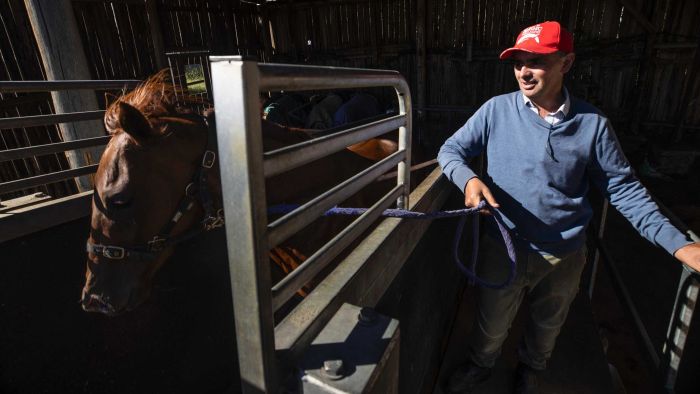Tasmania’s thoroughbred horse jockeys and trainers are not convinced the damaged track at Hobart’s Elwick Racecourse can be fixed, saying a new track may need to be laid.
Key points:
- The Elwick racecourse has been deemed unsafe and racing has been suspended until late January
- TasRacing has announced an inquiry into what went wrong
- Jockeys and trainers are sceptical the track will be ready for Hobart’s summer racing carnival
All thoroughbred racing at the track has been postponed until January 24.
The decision was made after concerns about the safety were raised when about 40 large divots were found on the track.
Horse trainer Brendan McShane is one of those who doubt the track can be repaired — and certainly not in time for the next Hobart racing carnival on January 24.
The head of the Tasmanian Jockey Association, Kevin Ring, is another.
“I hope I’m wrong, but I think this track is going to have issues right through,” Mr Ring said.
Mr McShane said the track issues had made Tasmania a laughing stock in the racing world.
“It’s almost to a point now where there’s no return — it’s just a laughing stock,” he said.
“For me to see my life as being part of a laughing stock is not something that I’d want read at my funeral, that I was involved in the biggest laughing stock of Tasmania’s history.”
Some races moved
TasRacing chief executive Paul Eriksson said the concerns about the track and the postponement of racing at Elwick until January 24 had meant a number of programming changes.
The $100,000 Tasmanian Guineas was due to be run at Elwick on December 27, but has been moved to Launceston on January 8.
The changes also include an additional race meeting at Spreyton, increased prize money at the Longford meeting on New Year’s Day and three additional Tasbred races in January.
“Importantly, no feature events have been lost under the programmed changes,” Mr Eriksson said.
He said the changes were not ideal, but also not unreasonable.




The jockeys and trainers disagree.
“It costs owners, trainers and jockeys money and they don’t earn. And especially over Christmas, everybody else was earning all around the country in racing but we’re shut down again — not by the Government this time. This time we’re shut down by in-house issues,” Mr Ring said.
Mr McShane said it had an impact on the horses’ performance because they were trained to be ready to race on a certain date.
“We spend all year to prepare ourselves for our carnivals so that when the mainland counterparts come down we can compete against them toe to toe and they don’t take all of our prize money away.
“So the preparation for the trainers and the horses is now completely ruined.”
Cause of damage to be investigated
Racing Minister Jane Howlett was part of an inspection of the track on Tuesday. She has called for an inquiry into how the damage was caused and who was responsible.




TasRacing is in charge of maintaining the track with advice from Strathayr, which supplies the lawn.
Tas Racing said it had flown in additional experts from Strathayr to look at the track.
It is not yet clear which of the two organisations is responsible for the condition of the track.
“I don’t know if I can really go into the details of that — we’re still looking at what did happen and there will be an independent investigation where all of this will be made public — what we’re really focussed on is to make sure that the track is right,” Mr Eriksson said.
A $12 million upgrade of the track was only completed in February this year.
Mr Eriksson said work was undertaken in December but some sections of the track had not recovered “to what we wanted”, and he said plugs were put in but “did not take”.
The decision to use sand instead of loam under the track surface has also been criticised.
“Choosing a sand profile to grow the grass instead of loam was a mistake and that is the reason why we have so many problems with the track,” Mr McShane said.
“The clods that were coming up are all full of sand and the jockeys were finding it difficult to ride on it because they couldn’t see, and now we’ve got to this point where parts of the track are dying and falling to pieces.
“[Keep] the profile of the track so we still have the drainage and the base is good — the profile needs to be studied and it needs to be adapted to what will suit Tasmania and the Elwick race track.
“It’s just going to be problem after problem after problem.”











